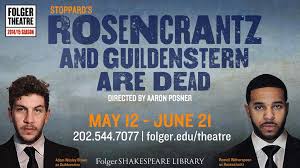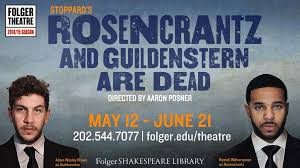At the beginning of this play, Rosencrantz (Rommell Witherspoon) and Guildenstern (Adam Wesley Brown) are flipping coins, and, defying the laws of probability, it is always coming out heads. It is a sign that the two men are caught up in a world they fail to understand. Rosencrantz and Guildenstern Are Dead is one of intellectual playwright Tom Stoppard’s earliest works and is, I think, frequently revived. It assumes the audience is familiar with Hamlet. Rosencrantz and Guildenstern are minor figures in the Shakespeare play, invited by King Claudius to draw out Hamlet and discover the source of his apparent madness. Later, they are told to accompany him on a trip to England. They are given a note asking the English King to murder Hamlet but Hamlet substitutes a forged missive asking that Rosencrantz and Guildenstern be killed instead. In Mr. Stoppard’s play, his two main protagonists read both notes but gain nothing by doing so. They remain hapless.
The play was written in 1967, during a time when existentialism was still somewhat in fashion amongst many of the philosophically inclined. Existentialism, in both its atheistic and religious forms, stressed that human beings found themselves in a world that was absurd, or at least rather opaque and uncertain; yet each person had no choice but to deal with the situation. Thus existentialism focuses on the need for human beings to choose, and to do so with resolution and authenticity despite the fact (as they saw it) that human beings had nothing to rely upon in doing so. One of the earliest of the existentialists, the Christian Soren Kierkegaard spoke of a leap of faith, for example. Many works were influenced by existentialism, including novels by Albert Camus, the play The Dumb Waiter by Harold Pinter, as well as, I think, the despairing, comic plays of Samuel Beckett. In retrospect, existentialism was almost as much a mood as a philosophy, a mood of anguish yet also a call to decision and action.
Mr. Stoppard’s play reflects the existentialist fashion without fully embodying it. Rosencrantz and Guildenstern do not at first grasp the situation in which they find themselves but even when they–at least partially with the assistance of the leader of a roving theatrical troupe (the excellent Ian Merrill Peakes)– come to understand more, they are unable to cope. The stage, in the first part of the play, is crowded with items adding to the sense of confusion. The production at the Folger Library in Washington DC emphasizes the comic elements and is not, I think, unfaithful to the play in doing so. Mr. Stoppard has created a play that is clever and amusing, interpolating scenes form the play Hamlet. While a different production could have been darker and more serious, the Folger’s provides an entertaining evening and even allows the audience, if so moved, to look upon existentialism in a more distanced way.
The play is being performed at the Folger Library in Washington, DC through June 21, 2015.


